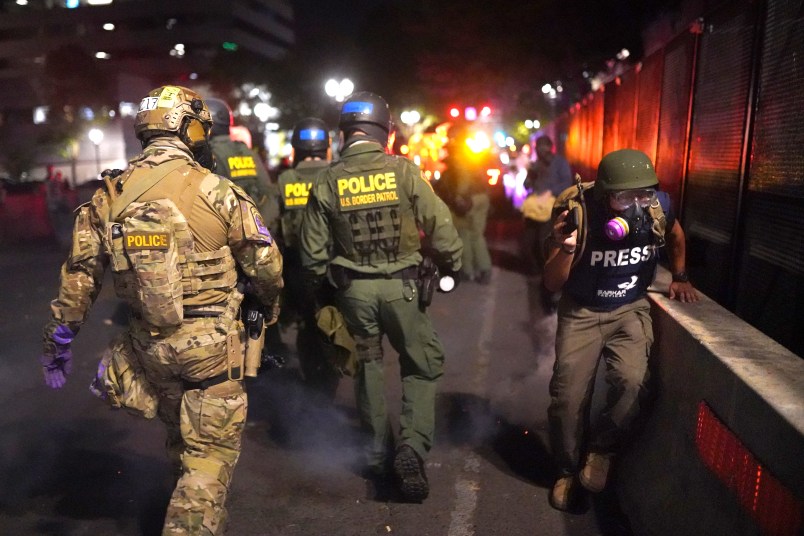The Department of Justice is pushing for a court order protecting journalists from arrest during the months-long Portland protests to be lifted, claiming that some of those engaged in violence have used the order to “masquerade” as members of the press.
U.S. Attorney for Oregon Billy Williams, with a group of DOJ attorneys, submitted a filing Thursday contesting the temporary restraining order issued last week by U.S. District Court Judge Michael Simon that blocks federal authorities from targeting the press, suggesting that it should be discarded or, alternatively, converted to a “preliminary injunction.”
Simon’s order also requires law enforcement to allow individuals claiming to be journalists to remain in place even when crowds are ordered to disperse.
Justice Department attorneys argued that “savvy protesters” were abusing the restraining order to “evade lawful orders, impede law enforcement, and perpetrate crimes.” The attorneys said that the restraining order had become “unworkable” and “must be dissolved.”
The original lawsuit filed by the ACLU of Oregon cited several instances in which journalists and legal observers had been targeted by federal agents. Mathieu Lewis-Rolland, a freelance photographer, claimed he was shot 10 times in the back with impact munitions by federal agents and Justin Yau, a freelance journalist, was attacked with tear gas.
The Justice Department cited reports from federal agents about protesters allegedly wearing “press” patches or badges and assaulting or interfering with officers or attempting to damage or scale the perimeter fence.
The filing argues that the restraining order further endangers law enforcement since “under the chaotic circumstances of the protests, it is difficult for officers, who are often wearing gas masks and laser protective goggles, to verify small indicia of press membership.”
In an interview with NBC-affiliate KGW8 lat week, Williams said the media have “failed” in their unwillingness to call out “people engaged in criminal conduct, as criminals, as opposed to lawful protesting.”
Pushback on the restraining order comes amid a Washington Post report Thursday that found the DHS’ intelligence office had been compiling reports on the work of journalists covering the Portland protests.
Acting Homeland Security Secretary Chad Wolf ordered the office to stop collecting information about reporters and called for an internal investigation into the matter.
The challenge to the restraining order also follows a tenuous agreement with conditions established by Oregon Gov. Kate Brown (D) with the Trump administration to ensure that federal agents retreat from the city. The agreement for the phased withdrawal of federal law enforcement, announced Wednesday, involves Oregon State Police reinforcing a security perimeter around a federal courthouse which has been a gathering point for many of the city’s nightly demonstrations.
The call to rescind the restraining order even amid a coordinated effort with state police seems to indicate an attempt by the federal government to continue its widely criticized strategy to quell unrest unquestioned and without restriction. The DOJ filing claims as much, saying that the restraining order imposes “unworkable restrictions on officers’ professional judgment.”
Matthew Borden, an attorney handling the case for the American Civil Liberties Union’s Oregon chapter, said protesters “masquerading as press” is both “ill-advised and rare.” But such behavior, he argued, “is not probable cause for arrest or dispersal, or justification for brutally and deliberately attacking reporters.”
“The restraining order simply orders federal agents to abide by the law, which is to not arrest, threaten to arrest, or use physical force against journalist unless the government has probable cause to believe that such individual has committed a crime,” Borden said in a statement obtained by Politico. “If the government objects to the order, they’re making clear what is already known: the government has no intention of following the law.”
Read the full filing below:







How long before Barr interferes on behalf of Trump?
Let us not forget that this goes beyond DHS…
New Pentagon training refers to protesters and journalists as “adversaries”!
So being able to freely report what is going on is now against the military’s tactical goals in the homeland?
Journalists everywhere should be taught that the US government considers them, not just adversaries, enemies.
Stay safe.
WTF is WRONG with ‘our’ DOJ??? They swore to uphold the Constitution but they pick and choose WHAT to protect?
If a member of the press (or someone pretending to be one) actually attacked an officer, of course they would be arrested, that’s simple logic and the court order doesn’t change that. This is just another attempt by DHS to abrogate Constitutional protections for the press to report on their activity. The leaders of the DHS would probably welcome the limits on our freedoms that China is imposing in Hong Kong, they are right in line with dictators sending thugs to beat protestors and control the news reports afterwards.